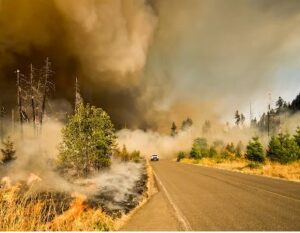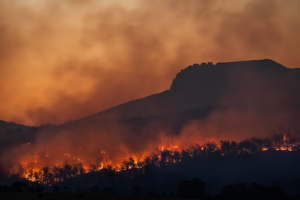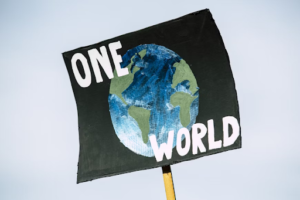Written by: Nabiha Khan
Edited by: Nehaa Kousihan
Designed by: Nabiha Khan
Published by: Maryam Khan
If you’ve been keeping up with the current environmental news, you might be aware of the Canadian wildfires going on, and how out of hand the situation has gotten. It seems the wildfires from our neighbour America have started to have an impact on us as well. So, is this the worst Canada is going to face? Or are there more uncertainties and disasters in the future for us?
First of all, when did this start? Canadian wildfires started getting featured more on our news around the start of June, with 3,412 cases being reported thus far. Considering that our ten-year average previously was 2,751, this is a devastating increase. It seems that this problem is fairly new, but does not seem like it will end anytime soon.

Photo taken by Marcus Kauffman, Provided on Unsplash.
The reason for these wildfires in general is because of the heat and dryness of our climate, which has increased dramatically due to pollution and global warming. Think of it like kindling for the fires to start, as the heat and dryness are perfect conditions for fires to break out. Due to pollution, spring is coming earlier, and fall is coming later than expected, which just gives the fire more time and climate to burn and flourish. Due to global warming, a lot of Canada has been heating up, which is a very big factor in the wildfires.
So, will this last? And for how long? Well, now that it’s finally summer, the temperature is going to be hotter than usual because of global warming, which will make it even more suitable for wildfires to occur. And because many people and the government still contribute to global warming without attempting to save our planet, this will likely continue for months or even years to come.

Photo taken by Matt Palmer, Provided on Unsplash.
Although what exactly does this mean for us Canadians? This might not seem like a big deal for an average citizen, but more than 150,000 Canadians have already had to evacuate their homes due to the wildfires. If this does not stop soon, this could potentially be the fate for you or your relatives. That doesn’t mean you should worry though, as the government will inform you if your area is a high-risk zone, and compensation and a temporary home are almost certainly guaranteed.
Even if this hasn’t affected you directly yet, you must step up for our planet and country. You can do this in small steps by recycling more, using less energy (turning off lights when not in use, unplugging unused chargers), or even just going outside more. Of course, if you want, you can try taking bigger action such as protests, online petitions or other methods, but be sure to be safe in your efforts to raise awareness.

Photo taken by Markus Spiske, Provided on Unsplash.
Altogether, we must remember that we only have one planet, and it’s our responsibility to take care of it and nourish it for future generations to come.
Sources:
Allan, Sue, and Nick Taylor-Vaisey. “‘Literally off the Charts’: Canada’s Fire Season Sets Records – and Is Far from Over.” POLITICO, 6 July 2023, www.politico.com/news/2023/07/06/canada-fire-season-00104959.
Kauffman, Marcus. “Photo by Marcus Kauffman on Unsplash.” White Vehicle near Tall Tree at Cloudy Sky during Daytime Photo – Free Natural Disaster Image on Unsplash, 11 Oct. 2017, unsplash.com/photos/-iretlQZEU4.
Korte, Cara. “How Did the Canadian Wildfires Start? A Look at What Caused the Fires That Are Sending Smoke across the U.S.” CBS News, 27 June 2023, www.cbsnews.com/news/how-did-wildfires-in-canada-start-spread-to-europe-midwest/.
Palmer, Matt. “Photo by Matt Palmer on Unsplash.” Silhouette of Trees during Sunset Photo – Free Climate Image on Unsplash, 7 Mar. 2021, unsplash.com/photos/kbTp7dBzHyY.
Spiske, Markus. “Photo by Markus Spiske on Unsplash.” One World Signage Photo – Free Climate Image on Unsplash, 6 Oct. 2019, unsplash.com/photos/r1BS0pzlr1M.

